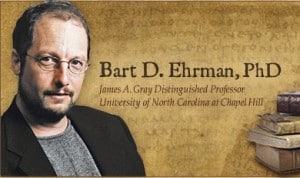Paul’s Damascus Conversion: Does Acts 9 Contradict Acts 22?
I’m seeing more and more anti-Christian apologetics against “Paul” as the faux founder of Christianity. Scholars like Bart Ehrman argue that Christ was originally just an apocalyptic Rabbi who eschatological vision crashed with his crucifixion.
The claim is that it was Saul/Paul, not Christ, who founded the religion of Christianity and that the historical Christ was universalized and divinized into a cosmic Christ.
The argument goes that Saul had some kind of conversion from radical Pharisaic Judaism to belief in Christ, but that Saul/Paul had zero interaction with the dead Rabbi Jesus.
It is true that Saul/Paul did not claim to have known or seen Jesus of Nazareth prior to His crucifixion. Instead, Saul/Paul claims to have met and known Jesus of Nazareth through mystical experiences.
[callout]To read of Paul’s three encounters with Jesus in the Acts of the Apostles, click here.[/callout]
Paul’s first encounter with Jesus is his conversion on the Road to Damascus. Luke retells the conversion of Acts and the narrative compares Jesus to an Old Testament theophany of Yahweh.
In Acts 9:7, Luke writes:
And the men which journeyed with him stood speechless, hearing a voice, but seeing no one.”
Here Luke is making the connection with God’s theophany in Deuteronomy with Christ’s theophany to Paul:
Then the Lord spoke to you out of the midst of the fire; you heard the sound of words, but saw no form; there was only a voice.” (Deut 4:12)
Notice that in both cases there is no visual form, but only the voice.
The Alleged Controversy of the Paul’s Damascus Accounts
The “heard voice, saw nothing” account in Acts 9 makes for a great parallel with Deuteronomy but it opens up a problem.
There is a alleged contradictory account of between Luke’s narrative account of Paul’s conversion in Acts 9 and the second version retold by Paul himself in Acts 22:6-9:
6 “As I made my journey and drew near to Damascus, about noon a great light from heaven suddenly shone about me. 7 And I fell to the ground and heard a voice saying to me, ‘Saul, Saul, why do you persecute me?’ 8 And I answered, ‘Who are you, Lord?’ And he said to me, ‘I am Jesus of Nazareth whom you are persecuting.’ 9 Now those who were with me saw the light but did not hear the voice of the one who was speaking to me.
Some claim that this contradicts the account in Acts 9 because:
- Acts 9: men with Saul hear a voice, but see no one.
- Acts 22:6-9: men with Saul saw the light but did not hear the voice.
The contradiction is dispensed with easily in this way:
- Acts 9 reports that the men saw no one and Acts 22 says they saw a light. This is not a contradiction. These men saw a light but saw no form or person in it.
- Acts 9 reports that the men heard a generic voice, but Acts 22 says they “did not hear the voice of the one who was speaking to me.” In Acts 22, the stress is on “the voice of the one speaking to Saul.” This means that the men heard a sound (Acts 9), but that it was not intelligible to them (Acts 22).
Here we can see that Saul’s encounter with Christ is not fictionalized. The fact that it is recounted three times in Acts is remarkable. It is the anchor of Paul’s claim to apostleship. Without it, Paul is merely an enthusiast. Luke’s Acts demonstrates that Paul’s apostleship is accompanied by miracles and this fact reveals Paul as a true and valid prophet for the New Covenant [Catholic] Church.
[reminder]
What to Watch Next
SHOP THE TAYLOR MARSHALL STORE
Dive Deeper

GET CONFIDENT IN YOUR FAITH
Explore the fascinating world of Catholic teachings with Dr. Marshall. Together you’ll unpack the brilliant answers the Church gives to tough questions about the Faith. The best part: you go at your own pace. Start this exciting journey today.


 >
>



